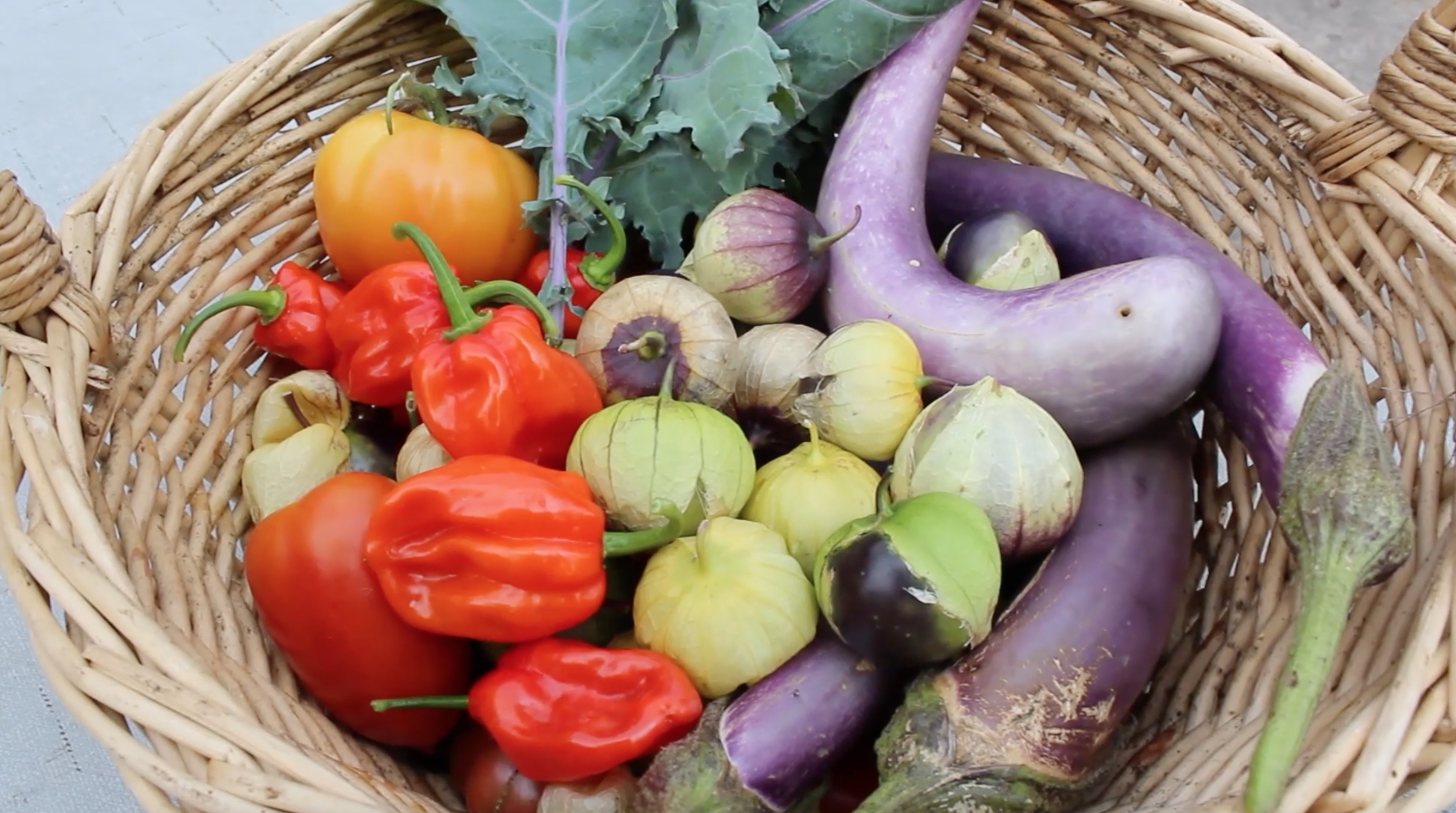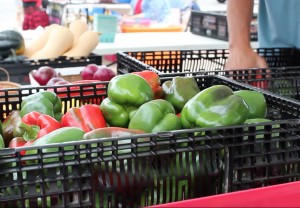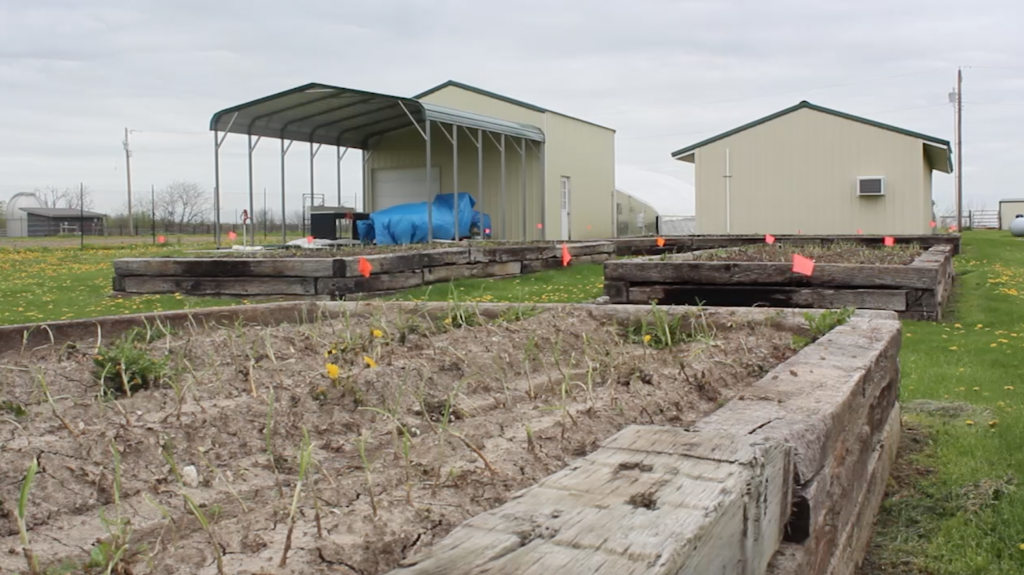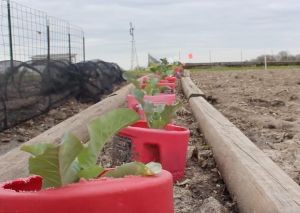
Sodexo serves thousands of pounds of food to Truman State students every week, but some students don’t give a second thought to where this food comes from or how it ends up on their plate.
Sodexo made a recent commitment to serve cage-free eggs nationwide, but large-scale changes will not happen until 2020. Although the switch to cage-free eggs is significant, there are no corporate plans to start using local or organic produce any time soon.
Lora Cunningham, Truman’s dining services general manager, has been pushing for the use of local foods at Truman for many years.

“I live in La Plata near an Amish community, so there were a couple of farmers that I knew really well,” Cunningham says. “We worked on getting our gardening guidelines down … and we thought we were going in the right direction.”
Cunningham says serving local foods in the dining halls is difficult because of Sodexo’s strict regulations. The most difficult obstacle to overcome is that every vendor Sodexo purchases food from must have a $5 million liability plan, something extremely difficult for small, local farms to obtain, Cunningham says.
The liability insurance protects farmers and vendors in the event someone becomes ill from consuming their food and decides to take legal action, Cunningham says. This insurance is easier to obtain for large-scale farms on the West Coast that provide Sodexo with most of its food, making them more appealing vendors to Sodexo, Cunningham says.
Cunningham says if a farmer is not an approved Sodexo vendor, she personally must decide to buy from the farmer. If anyone becomes ill from that food, Cunningham says they not only could sue Sodexo, but they also could sue her and the non-approved vendor.
Cunningham says she searched for loopholes after being frustrated by corporate rules and regulations.
“I had been basically buying [local produce] with my money out of my checkbook, because Sodexo wouldn’t pay [the local farmers],” Cunningham says. “And then I would try and run it through an expense report. Well, I got my hands slapped about one too many times, and it got so that we were buying so much so that my personal checkbook was, like, down to zilch. And I’m waiting on Sodexo to reimburse me, which takes a couple weeks, and I’m sitting here thinking, ‘There’s something wrong with this picture.’”
Cunningham says she tried to get local farmers approved by Sodexo, but their gardening standards didn’t meet the company guidelines.
Although the amount of local produce Truman dining services uses has decreased, Cunningham says there are still many difficulties in processing the food they do have.
For one, the Midwestern climate makes it difficult to obtain local foods during the winter, meaning food would need to be stored long-term during winter months, Cunningham says. She says Truman Dining Services would need to add an entire kitchen just for storing and flash-freezing foods for the winter, and it would have to pay additional employees to prepare the foods for storage.
“It ends up being less expensive — much less — if I buy it from a vendor,” Cunningham says.
In addition, because of health codes, the local produce frequently arrives unwashed and uncut, Cunningham says. She says she then has to pay employees to process the food.
“I don’t have the time to snap the beans, I don’t have the time to clean and process all the onions,” Cunningham says. “The potatoes, according to the health codes — they come straight out the ground and they come straight to me. So I’ve still got all the dirt, I’ve still got all the tops, so it takes twice as long before I can even get ready to process something to be used. [It] doesn’t make good sense.”
Despite these challenges, Cunningham says she still hopes to continue bringing local foods to Truman and increasing the amount of local foods served during the future.
“There’s a lot more to being able to do local — much more than I think anybody thinks,” Cunningham says.
Now the only farm Cunningham acquires local produce from is Truman’s University Farm, in spite of the fact that it also does not have the correct liability insurance, says Bill Kuntz, University Farm manager.

Kuntz says the farm currently is trying to purchase the liability insurance Sodexo wants, but the fact that the farm is connected to the University is complicating the process. However, the farm still sells produce to Sodexo because it is part of the University and they have an understanding, says Kuntz.
“We kind of got around those hoops because we are selling to ourselves,” Kuntz says.
Over the past few years, the University Farm has supplied Sodexo with produce such as potatoes, tomatoes, watermelon, peppers, cucumbers, zucchini, squash and pumpkins, among other things, says Kuntz. However, this year the farm experienced a total crop failure because of heavy rainfall and was not able to supply any food to Sodexo, Kuntz says.
Kuntz says the University Farm produce technically is not certified organic, though they do not use pesticides.
“I follow a very sustainable practice,” Kuntz says. “If I see a pest, I will only apply something at the site of where the pest is. The amount of pesticides that we’ve ever applied since I’ve been here is very minimal.”
In spite of their sustainable practice, the process to become certified organic is lengthy and complicated, and the farm has not really considered applying for the certification, Kuntz says. He says he’s not sure if the University Farm would even pass the certification because they do use pesticides on grapes.
“You can do vineyards organic, but it’s very difficult in the climate we have to keep your grapes healthy,” Kuntz says. “And so that is one thing I do spray with fungicides on a regular basis, just to keep them healthy.”
During 2012, the University Farm received a $30,000 grant from the U. S. Department of Agriculture to begin growing and selling food to Sodexo, says Kuntz. He says the program is called Farm to Table, and the grant money helped pay for planting and harvesting equipment, vegetable washing equipment and internships for students to work on the farm.
However, Kuntz says they are now out of grant money, making it difficult to continue the program and grow the amount of food needed.
“I feel pretty strongly about growing produce for the university — I think local produce is very important,” Kuntz says. “Otherwise, once the grant ran out, I would have quit doing it. And we try to make it every year, but it’s a struggle. Once [the local foods movement] gets going I think it would be highly successful, but it’s going to take more than just the University Farm.”
But it’s not just farmers who are dedicated to the local foods movement. Some Truman students are catching on and advocating for change in the kinds of food served on campus.
Junior Kaitlyn Meyer, Environmental Sustainability Fee Committee member, says she wants to see an increase in the amount of people growing their own produce and buying local foods.
“The biggest things for me is that [buying local foods] reduces carbon emissions,” Myers says. “Food doesn’t have to travel as far, so it’s better for the environment in that perspective. And then also, I like the idea of supporting smaller farmers instead of big corporations, so you’re supporting a person instead of supporting this name that doesn’t have a face to it.”

Meyer says she would like to see more local produce used in the dining halls on campus, especially from the University Farm.
“I really support us getting food from the farm because students would likely be growing it, so there are at least students being involved in the production of the food,” Meyer says.
Meyer says the Environmental Sustainability Fee Committee currently is proposing its slate of projects to be funded, and among them is the Farm to Table program. She says the committee will potentially be giving around $5,000 to the program in order to pay for more student internships over the summer.
Despite this, Sodexo and Truman Dining Services do not expect to be able to serve a majority of local or organic foods for a very long time. Meyer says in the meantime, students should still care about where their food is coming from and advocate for change.
“It nourishes our body, so do we really want to be putting something that’s processed and not very nutritious into our body?” Meyer says. ” … It’s such a crucial thing that we need, so we should probably pay a little more attention to it.”
